[Preamble]
It’s been a bit over eight years since this article was originally published. A lot has happened since then, and the world has changed a lot since then. I have changed a lot since then.
For the last couple of weeks, Twitter has been telling me that lots of folks are finding this post. (Maybe it’s just me, maybe it’s not, but only seems to have started really flooding in earnest since crypto-bro Space-Karen started fiddling with the algorithm.) Regardless— if that’s going to be a thing then it seems like my responsibility to frame what’s below for context, because a lot of what I wrote in 2014 is underpinned by dead-end and harmful assumptions that could continue to be harmful if people start sharing this… article? manifesto?… as a hot-take or some kind of blueprint for positive outcomes.
I was young and living a fairly culturally insular life as a settler colonist in a privileged Western country, and even in the best cases there is a certain amount of naivety that comes with that experience. Working in the blockchain industry developing corporate consortium, public Ethereum-based and open protocol ledgers kicked a lot of that naivety out of me.
So let’s talk about the shortcomings of blockchain before we delve into an optimistic utopian perspective on it, for there are many failures to observe.
Importantly in the context of this post, blockchain has failed at privacy. A ‘fully public’ pseudonymous design essentially makes all information readable and attributable, but only to parties with privileged technical power. (The entire Bitcoin blockchain is now said to have been de-anonymized by the NSA and ConsenSys is doing great work de-anonymising Ethereum.) On the upside the design principle of “public by default” should cause a shift in the mentalities of technical architects; though in many cases it does not and the users of different early-stage blockchain projects will be the ones who bear the cost of having their email address etched permanently into a public distributed ledger.
It’s failed at decentralisation as well with major central players like Infura (which runs on Amazon Web Services) in most networks. And even if that infrastructural centralisation didn’t exist, the plutocracy of ‘mining’ is always going to be present by design and there are a myriad of other failures to observe.
It also fails at trust, for trust built by machines is actually a substitute for trust between humans; and paradoxically breeds mistrust.
From a technical perspective it’s essentially a glorified hashmap with very limited Turing capabilities and offers little in the way of foundational abstractions for building serious applications.
And despite a few outlying successes in redistributing funds for charitable purposes, the industry as a whole has done little to innovate or address humanity’s global challenges. What it has done a lot of is create aggressive adherents and detractors protecting the sunk costs of their investments, crypto-bros with lambos, new kinds of fascism, and well-travelled vast ecological externalities.
But more than any of this, the greatest shortcoming of the ‘blockchain revolution’ is its culture.
More than any industry I’ve worked in, blockchain is a toxic and violent space. Due to the technical complexity involved projects require at least half a mil before you’re able to do anything; and whether it be in accelerator spaces or public-sector contracts or private-sector moonshots, competition for these unbelievably scarce resources and opportunities is fierce. That leads to equally fierce corporate and social behaviour— in the two-year period in which I worked in the industry I personally experienced attempts at coercive hiring practises, sabotage, factionalisation, bullying and an attempt to incite a hate mob against me. I continue to hear first-hand accounts of bullying from friends in the industry as well as stories of sexual predation, embarrassing self-promotion, publicly visible corporate rivalries and altercations, and trash-talking collaborators in order to win over their contracts.
Many of the women are just as much bullies as the men, intersecting with this toxicity somewhere near what I would reference as the “Margaret Thatcher trope”. If you come in with breasts one approach is to be the meanest nastiest S.O.B. with the biggest dick in the room in order to garner any time or respect from the misogynistic men who dominate the space.
Even when it’s at its best, blockchain and the mentalities it carries with it are still just extensions of the colonial project, and tools of oppression. About the most positive projects I could say I’ve worked on are supply-chain transparency systems; and most of those both centralise corporate power and extract knowledge from ecosystems to be sold back to them or on to others as profit.
The insight that “true evil is to make your truth everybody’s truth” came to me, funnily enough, through a friend reading Finite and Infinite Games— a book well-travelled in cryptocurrency and blockchain communities. Yet this is exactly what blockchain does. It fights against the laws of physics at enormous energy expense, introducing scarcity and monetization to subsidize that inefficiency. All so that one truth can be made everybody’s truth.
So for all these reasons and many more besides, I don’t believe blockchain will ever live up to the naive aspirations that younger pospi raves about below.
The blockchain revolution is a dead-end. It sprouted too close to capitalism, and the logics of capitalism consumed it.
There are better patterns unfolding, but there are no sure bets.
It’s time to put cryptocurrency and our self-interested behaviours behind us.
It’s time to put blockchain and our monolithic worldviews behind us.
And, as before, please remember what I said last time:
Anyone who purports to know the outcome of this chapter in our history doesn’t know what they are talking about.
***
Do you ever stop to think about the ways we communicate?
When you talk over the phone your call can easily be monitored or recorded. Your private life is potentially exposed, but just for a brief moment. No big deal, right? Nobody is going to be listening to you unless you're doing something wrong. But the call itself and the fact that it happened is retained for a few years by your phone company. Thus that window into your life is widened, just a little bit.
When you send someone a text message the person you're texting, your location and the message itself are also retained for a few years by your phone company. When you visit any website or use any app which requires an internet connection the same thing happens and could soon be mandatory. The window widens again.
When you chat on Facebook literally everything you're saying and in some cases what is going on in the room around you is recorded. Forever. If not by Facebook then by the governments tapped into the internet backbone. When you use Google Hangouts you record your face, what you're doing and the environment around you and hand that over forever too. It happened with Yahoo Chat, and it will happen again. When you sync your files to Drive or iCloud or OneDrive or Dropbox, you give away the very real and substantial value of the contents of your hard drive. When you sit in front of a Kinect, you invite Microsoft and probably the US government into your home to study you in intricate high-def three-dimensional detail. When you post and tag those photos of your night out on Facebook or Instagram you provide structured information to assist a powerful AI in enhancing its detailed 3D maps of you and your friend's faces and predictive models of your behaviour. And when we start wearing Google Glass around and buying devices like the Amazon Fire, we will be handing over the world around us in real-time.
Truly. Legitimately. Non-crazy like. As described in the NSA's own documents as “Collection directly from the servers of these U.S. Service Providers: Microsoft, Yahoo, Google, Facebook, PalTalk, AOL, Skype, YouTube, Apple.” Petabytes of it every day. Handing over our data until, as Google's CEO said, “We don't need you to type at all. We know where you are. We know where you've been. We can more or less know what you're thinking about.”
It's as if we want to do away with the window completely.
Where does all this information end up? Often in the hands of criminals, for sure, but mainly it goes to algorithms. Naive algorithms, burgeoning algorithms, imperfectly overaggressive 3-hop algorithms which mean that literally everyone is a target. Corporations and governments sweep up that data, store it away permanently, and then bully, manipulate and harass us into submission with it.
So what if some of the links above aren't relevant anymore? So what if Facebook put up a nice little PR page and clarified their use of audio? They still require that depth of access to your life. They still forced us to give it over. They have still betrayed our trust and tried to bullshit their way out of things. But we'll keep using them, because there's "no other choice". We'll keep letting our government representatives take away our rights, and we'll keep re-electing them too, because there's "no other choice" there either.
C’est la vie? Not so.
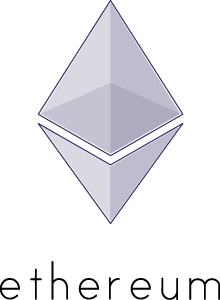
Ethereum began its journey in November 2013 and has steadily been building toward a stable, production-ready network ever since. It first came to my attention in early August, with a post in an RSS feed linking to this highly technical but utterly fascinating talk by Gavin Wood. I later found an earlier, kind of brief summary by the organisation's CCO Stephan Tual - but back then it still seemed to me like they were reeling with the implications of what they had built. But then just recently this talk went up:
I highly recommend you watch it - the first 6 minutes summarises everything you need to know, and the next 45 or so goes into the implications, potential applications and details of the system. The last hour is people asking rather testing and concerned questions, which I think all have their answers and Stephan's responses do much to satisfy them. Perhaps this post can assist with some of those concerns as well.
Ethereum will finally liberate information for all of us. It will bring equality and true intellectual independence to all connected to it. Even the idiots making the laws and shady deals. Centralised power and the corruptibility of human beings is not an inevitability. And once the message is out there and people start to see how this enhances all our lives, the uptake will be swift.
Suffice it to say that Ethereum will change the course of human history, and that you should take the time to understand it.
- Introduction 3 - 4 min
- Not all software is created equal 2 - 3 min
- Where software and society intersect 2 min
- The internet is broken 2 min
- Flipping it upside down 4 - 5 min
- Learning to trust 3 - 4 min
- Letting go 1 - 2 min
- Finding our feet 2 min
- Making it work 3 - 4 min
- The rocky transition 2 min
- 19 - 27 min
Not all software is created equal
To understand - and I mean really understand - what the internet is now and what Ethereum will make it, you need to understand something simple about the nature of computers.
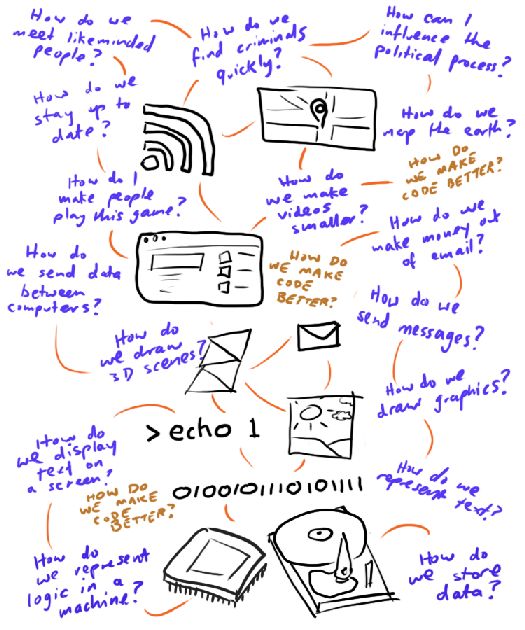 Computer hardware and software are really much less complicated than people think. They are just collections of ideas communicating with each other. Ideas stacked on top of each other, from the very tiny details to the very large concepts. It is nothing to be scared of. It is just us as a species doing what we have always done - standing on the shoulders of giants. It is humanity taking the good ideas of their forebears and adding more ideas on top. The internet really is no different in essence to a car or a toaster or blanket over a fire sending smoke signals. It's all technology made from ideas about how the world works. Smoke signals are one of the oldest technologies built for communicating, but in fact it is speech - language itself - where it all began.
Computer hardware and software are really much less complicated than people think. They are just collections of ideas communicating with each other. Ideas stacked on top of each other, from the very tiny details to the very large concepts. It is nothing to be scared of. It is just us as a species doing what we have always done - standing on the shoulders of giants. It is humanity taking the good ideas of their forebears and adding more ideas on top. The internet really is no different in essence to a car or a toaster or blanket over a fire sending smoke signals. It's all technology made from ideas about how the world works. Smoke signals are one of the oldest technologies built for communicating, but in fact it is speech - language itself - where it all began.
The difference now is that our ideas are preserved losslessly - so where before we had words and ambiguities and double-meanings and memory loss, we now have ones and zeroes building code building websites that play 4K hi-def 3D video that anyone can see and that never degrades. All we software developers do is talk to people and analyse problems. We describe them in a language of precision, down to the finest detail, until there is no room left for misinterpretation. Then we use that idea to run a business, or we share that idea and let anyone use it. And this is where open source and closed source software come in.
Closed-source software means simply that nobody can see the ‘source code’ that an idea is made of. All you get is computer gibberish that you could not possibly hope to reason about even if you could somehow unwind it. The computer is just a machine, and inside it someone has recorded some ideas that take the text you type into it and turn those into further ideas it can use. With closed source software, you don't get to see the text a person wrote when they thought through the problem. Using closed source software is exactly the same as trusting an accountant without seeing their math.

In a closed source platform, you're expected to take somebody else's ideas and put them in your computer - in your home, for there is no separation anymore between our physical and digital lives - and let them run wild. You are expected to trust them, and I mean trust them completely, because the internet connects so many ideas running on so many computers to so many other ideas that literally anything could happen up there, even in the most seemingly trivial of circumstances.
Open-source software is a body of shared ideas. It is mostly the same people who build closed source software for money, analysing problems and finding workable solutions and dictating them to machines to preserve them forever; and then selflessly giving them to the world. Most businesses today have a policy for open source contributions and release whatever they feel is appropriate to release publicly. We as developers are lucky to have such a thing - the scientific world is not so inclusive in the distribution of its information. Open source software is ideas created and shared for the common good. And it runs the world, because even the closed source companies use it. They use it because you can trust it - because it has no agenda other than solving a problem and it is easily peer reviewed.
Where software and society intersect
One of Australia's own representatives, Senator Glen Lazarus was recently quoted as saying “the internet poses one of the greatest threats to our existence”. Seriously. But while the man might have had one too many concussions and speaks out of complete and total ignorance, unwittingly he echoes the concerns of the wealthy elite running corporations and governments. The internet threatens their model because it gives the individual power to connect and organise with likeminded people. It gives the individual the power to profoundly affect society, as the directionless Anonymous showed us in Tunisia and Egypt.
Like software, society is just collections of ideas. But unlike software, the ideas in society have room for error. They are interpreted and realised by people rather than some predictable process that can only have one provable outcome. Worse, over time they become forgotten, warped, co-opted and eroded until somehow we arrive at a point where we can still say with a straight face that we have probable cause while our governments lock people up without warrant. Like software, society is all about trust, and that trust is inevitably lost as the power of the people entrusted with authority grows.
Modern life runs on data and interfaces. Companies and governments and even individuals now have too much information to process daily without the aid of a computer or a smartphone. We talk via text using apps designed to make money for their masters, built for communication now only as a secondary function. Software is baked into every facet of society, from marketing to romance to finance to justice. The design of that software matters.
Nothing exists in a vacuum. Remember those freedoms we used to have? Remember when the press was independent and journalists were looked on as heroes instead of public enemy #1? Remember when Facebook just showed you what your friends were doing instead of de-prioritizing their posts and stealing their likenesses to show you sponsored ads in your news feed instead? (I did NOT like Samsung Australia!) Even Twitter, once a predictable and useful source of events, now cripples its functionality to serve its own interests and forces us to give away more information via our dependency on it. Our basic human right to communicate and share information has been co-opted and taken from our control.
These facts and the problems they cause are more critical than any other events in our history, because we are social animals*. We need to communicate, even simply to be sane. We need to communicate to learn and grow and progress both as individuals and as a society. We need to communicate in order to survive. When we can no longer spread information without government backlash or corporate manipulation, we lose the most important thing about being human. Communication is just sharing information. All communication, all knowledge, all art and all technology is just data.
Sorry, hermits. I guess you guys are 'excluded' oh ho ho
Tunisia and Egypt and Turkey and Russia and China and basically every Arab country may seem like faraway places to us in the West, but the reality is that we sit perilously close to these catastrophes. Tensions everywhere are rising between the people and the state. Something needs to be fixed, fast.
The internet is broken
If you always do what you always did, you will always get what you always got. Albert Einstein
The internet is just software communicating. It's the answer to the question “how do we make the ideas on one computer talk to the ideas on another one?”. But it is an old answer built on old ways of thinking.
Despite being the great equaliser of information that it is, the internet is still largely centrally controlled. We still sit on top of an ageing and cumbersome infrastructure laid out in the ’70s, built on top of the phone lines before it and the telegraph before that and the postal service before that. Each of these things requiring central governance and complicated maintenance in order to be effective.
The internet is broken because we are manipulated by central power. We are given powerful, self-enabling tools and then our trust is traded. We are offered one thing and then corporate greed or government control takes over and rips it out from under our feet. A frightening amount of the way we communicate and do business depends on Facebook for engagement, Google for information*, Amazon for computing power and especially Twitter for direct communication. Entities with their own interests that we have no control whatsoever over. We have long been a client-server internet, and we need to be peer-to-peer.
Seriously, install that plugin and see how much of the internet depends on Google for yourself!
Powerful people in powerful places are trying to push the equality the internet gives us back in their favour. Verizon, AT&T and Comcast are spending millions to convince the US government that it is a good idea to cripple the internet with the ability to independently control the speed of websites. This is great for faster YouTube, but life-threatening for a journalist fighting to get critical information out to the public. Once you create such godlike power over information, the world lives with those modern-day superpowers in somebody's hands forever. If you were the US government, would you be tempted by 100 million dollars? Or by the power itself? This does not just affect Americans. We should care globally about the outcome of these laws, because what happens in America affects us all - the computers that control all web addresses on the internet live there.
The internet is broken because society is broken, and we have built it to mirror our world.
Flipping it upside down
Ethereum fixes this, all of this - our communication pathways, the information they contain, our ability to trust each other and eventually society's problems themselves. It essentially rearranges the way the whole stack of ideas (which developers call the "software stack") fit together and turns all these smaller brains all over the internet into one gigantic collaborative machine. Asking what you can build with Ethereum is like asking what you can build with a computer. The answer is everything.
Since we all know how going to the bank works, let's use that to illustrate. You walk in and ask for some money. A teller checks your balance, subtracts the amount from it, and gives you the money. End of transaction.
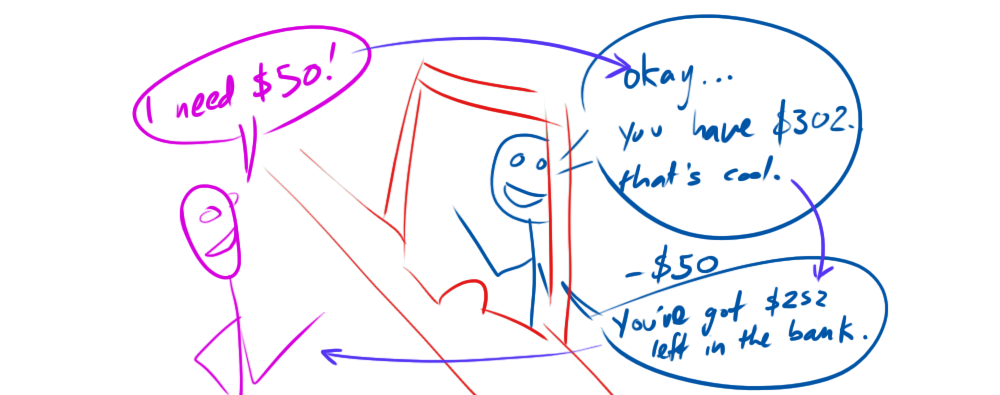
These days most people go to the bank at an ATM or online. This is also a simple process - we just replace the teller with some code and have a machine do it for us:
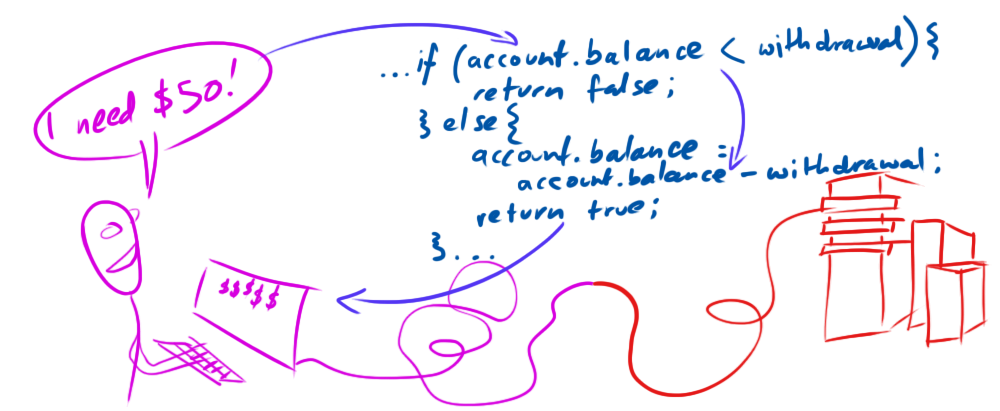
In each case the bank is the ultimate authority on what is happening. If the bank or their systems say you have no money, you don't get to take any. You must trust the bank to keep track of your funds for you. Banks don't typically break that contract, which is great. But they still charge you for their service, and they often use that money for purposes you as an individual would be horrified by. And they are still central powers which the vast majority of people today would agree are corrupt.
Noticing this, some people invented Bitcoin and simply shifted the responsibility of maintaining account ledgers to everyone. Instead of a single authority deciding whether you can access your money or not, a set of computers on the network opts to process transactions on others' behalf. The network decides by consensus whether a transaction is valid or not, and nobody needs to be in control. Decentralised money was born.
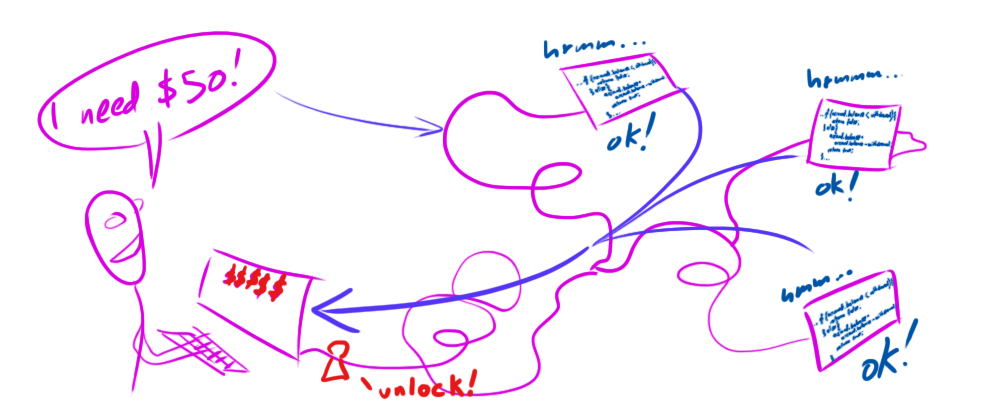
In terms of what you can do with code, money is about the most trivial example you could pick. It seems obvious that computers are good at managing money, because most people think of them as big calculators. Well, I am here to tell you that thinking this is a mistake. To say that computers are just for doing maths is to ignore all the interesting, exciting, powerful things they can do and focus on the mundane.
Take something less ‘mathsy’ like catching up with people's lives on Facebook. Imagine how many variables go into the formula that creates your news feed - most of them sensitive information about you and your social connections. Imagine how many gatekeepers are required and how all those ideas fit together to pull that information out for you:
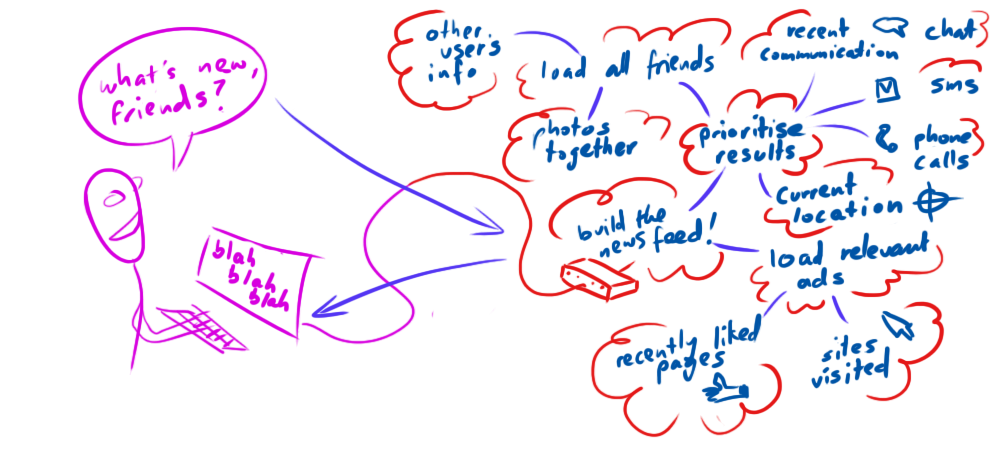
That entire process is Facebook's, along with all the data that flows through it. They are the authority that brokers the communication between you and your friends. Many other silent authorities also play a role - from those who manage the security between your browser and Facebook to the people who run the cables your internet comes through. There are a lot of large, centralised powers to trust in this arrangement.
Banking, our social lives and really any process imaginable can be turned into code. So it's not a terribly difficult stretch to take the single-purpose system we already proved with Bitcoin and turn it into a generic computing platform that can run any program.
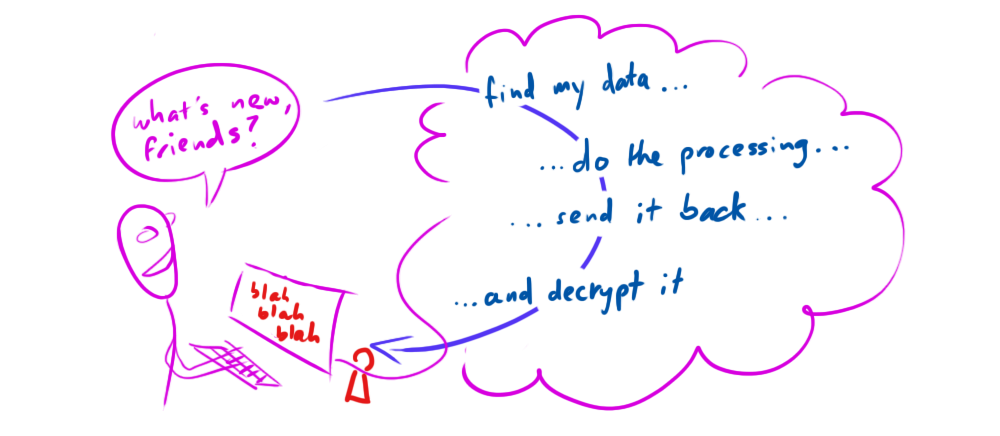
I recall reading somewhere that “Ethereum is to Bitcoin as an iPhone is to a calculator”, which is a pretty good analogy. Bitcoin proved to us that it was possible to keep a tamper-proof system synchronised across the globe. There really is no reason the same system can't be applied to other problems in the same way we apply normal computers to them.
Ethereum is a single computer spread out over the internet, processing the information we all feed it together. I guess you could call it a ‘shared consciousness’ if you wanted to.
In this computer, information cannot be suppressed. In this computer, ideas and trust rule. Work and reputation are visible and independently verifiable. Anyone can contribute and everyone is automatically safe. Collaboration will overcome privatisation as people work together to build an open network of ideas contributing to the betterment of us all. They are calling it internet 3.0. And though web 2.0 was a thing in some ways, I think we'll look back at everything up until this point as the first internet. The internet we built by adapting old communication lines into new ways of communicating. The internet we built when we were still used to centralising responsibility for things.
Even better, systems like Ethereum mean the barrier to entry is minimal. You will not have to pay to contribute, even though Ethereum is a monetized system, because upon entering the network for free you will be provided with an array of tasks you can complete to earn money. You will no longer need expensive hardware to build and run your part of the internet; instead you can login with any device anywhere and upload your idea into the collective. It will exist everywhere and nowhere. People will not have to install it. They will not have to create an account or login to use it. It will simply be there, everything they need, made for them and them alone and not some corporate empire holding their information to ransom.
In the future we won't have dedicated servers or datacentres, we won't rent them, we won't need them. They would just be wasting computing power we could adapt into a workstation and put someone in front of. Every computer will just be an identical window into a vast landscape of knowledge and creativity, sharing whatever available horsepower in it with the rest of the collective.
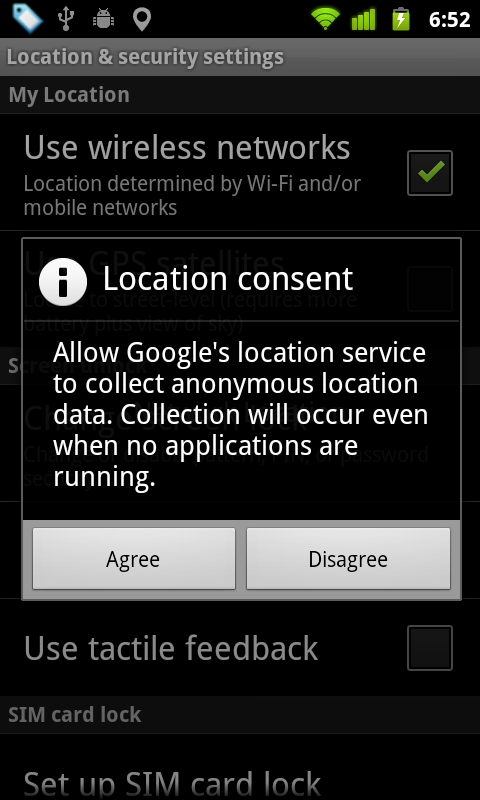 As a result the internet will work better. It will be more secure and stable, because the people passionate about running it and giving up their time will be directly rewarded. There will be no more HeartBleeds or ShellShocks - no more Steve and Steve holding up the internet all on their own. In the new internet, you won't be faced with dilemmas of choice. There will be no more "Google maps is convenient, but I have to tell Google where I am at all times to use it". In an open system, people just rebuild the broken bits. When an idea is used selfishly or unfairly, people just fix it and switch out that component for something more egalitarian.
As a result the internet will work better. It will be more secure and stable, because the people passionate about running it and giving up their time will be directly rewarded. There will be no more HeartBleeds or ShellShocks - no more Steve and Steve holding up the internet all on their own. In the new internet, you won't be faced with dilemmas of choice. There will be no more "Google maps is convenient, but I have to tell Google where I am at all times to use it". In an open system, people just rebuild the broken bits. When an idea is used selfishly or unfairly, people just fix it and switch out that component for something more egalitarian.
The best thing is this time, we don't even need to do anything physical. The lines have been laid out, the foundation is solid and the structure is ready. All we need to do is change the way we think about the internet and the way it's layered. Once we have achieved that we can start changing the way we think about the world, too.
There will still be many other problems left to solve. Software isn't going to fix global warming or overpopulation. Not overnight, anyway. But the coming age of decentralisation means that we will have far better tools and information at our disposal, this time with all hands equally on deck.
Learning to trust
Trust is probably the greatest worry we all face. On just about every level of life - family, love, friends, business, politics - it governs how we behave, judge and relate to people. Losing trust hurts more than just about anything - whether the hurt is emotional, financial, social or otherwise.
People aren't predictable or stable. Though we sometimes might allow ourselves to, we really can't trust them completely. We can't ever fully understand them, not even really ourselves. People flip after 30 years of happy marriage and murder their whole families all the time. But we understand machines, or we understand the basic theory, and consequently we find it easy to trust in them because we can predict them. By this I mean all machines, from hammers to hard drives.
We refer to Ethereum and Bitcoin, its early ancestor,* as “trustless systems”. The phrasing makes it sound like a bad thing, but perhaps more accurately it could be called a “trust no-one, trust everyone” system. Computers are deterministic machines, which means they are predictable. If you give a computer the same input more than once, you will always get the same answer. People have to go to great lengths, like sampling atmospheric noise, to create true randomness in a computer. And the only possible solution is to use something random from the external world as input to make it happen.
Yes, a few years is millennia on this time-scale.
What does this have to do with trust? We don't trust when we don't understand. We don't understand when something appears random. Computers cannot be random. And you can communicate anything or represent any idea in a computer. So when you put something in, you know exactly what is going to come out. And when the whole world has access to a history of the same input that has gone into the computer, then the whole world knows exactly what the output should be. So you don't need to trust anyone anymore, because you can trust the computer. Because you can trust the computer, you can trust everyone.
On an individual level, the only way to steal somebody's data or spy on their life is to steal their private key - just like stealing someone's house key to get access to their physical belongings. But though it's that simple, the consequences are far more dire - it would be your reputation and ideas stolen in the event of a breach, not your possessions. One of the only tradeoffs of this new age is that you must assume full responsibility for your online security. It is an easy responsibility you should have assumed long ago. Your account can be kept safe Dragon Ball Z style, by dispersing fragments of your backup login across the globe*. This is not a new concept - these mechanisms are already provided by Google and others in order to recover lost accounts.
Edit: being flippant here, but it is kinda like that. For an interesting discussion on the technicalities and implications of decentralised security, see these comments below.
Since computers are deterministic machines like calculators, we can also prove theoretical things with them as we could algebra. So we can prove, with math, that with this worldwide free encryption for all it would take millennia for modern-day computers to break into even a single account. And when our computers evolve to be faster, these ideas about encryption and data security will evolve to meet them. You simply need to know that your information is safe in this system. From everybody.
Unfortunately, unless you have advanced degrees in both computer science and mathematics, you will probably never fully understand cryptography. I am sorry but this is just the way it is - believe me I have tried! But that shouldn't be any deterrent. You might not understand the security system in your car, either, but you know you can depend on it. Instead you need only to be aware of the people or organisations who do understand and the consensus given via their expertise and reputations. It is just like any field, if we need to know something about the weather we ask a climate scientist; if we need to know something about computer security we look to cryptographers and hackers. Because Ethereum is open source, the people in the know can critique it and advise us. You just need to be careful who you trust and cross-check your facts, as with anything else.
Letting go
The decentralisation singularity will be sudden, and it will terrify people. Particularly the people who don't understand. If you have read this far then your interest more than qualifies you to help with that process. Expect to see misinformation, expect to see smear campaigns, expect to be fielding questions from your friends like, "isn't that just for criminals?". The internet scared some people too. But we came out the better for it, and only because Tim Berners-Lee decided that it was right that everybody own it. We will come out ahead again.
The argument we are often pitched is that central control is necessary, that some must govern over the many to keep us all in check, civilised and sane. We are told over and over again that is is the only way that it can be. The same structure that has failed us countless times before in history, from the Egyptians to the Monarchs, endlessly recycled and still we cling to it. Power centralises and inevitably corrupts, and then it crumbles to give way to the next vicious cycle of the same old thing. From communism to fascism to capitalism to democracy.
Milton Friedman espoused the virtue of a world governed by greed and self-interest, and gave us the capitalist system we know in the West. But now that we're connected, we don't need to live with that cynical outlook. You only have to look at Change.org, DemandProgress, GetUp and all other forms of digital activism to see that people innately care about each other across even the deepest cultural rifts. And now that we have a system where we can simply remove all those borders, the divisions become meaningless. It's hard to ignore pain when you can reach out and touch it.
Some will continue to say that control is necessary and inequality is an unavoidable part of life. But isn't removing that inequality a step we have to face at some point if we are ever to reach harmony as a species?
Finding our feet
Democracy, then, in the centralizing, pattern-making, absolutist shape which we have given to it is, it is clear, the time of tyranny's incubation.
Bertrand de Jouvenel
There is a lot of talk about governance in this new model, and how it might or should work. Some of Ethereum's contributors have been talking about the idea of futarchy, but I believe things could be even simpler than that. I think the future will be, or even should be, more ad-hoc. People will gravitate around ideas they are passionate about. They will form their own communities and self-govern that aspect of our collective thought. If they are successful they will be rewarded, if not they will do something else. We do this already, online and off - we start businesses together and join clubs and congregate around our interests. In a way, Ethereum is rearranging global society to feel more like hanging out with your friends.
The proof that this works is right there in today's internet. It already runs and works without governance - fads come and go, empires rise and fall and overall it keeps evolving and improving. We can try to speculate as to where it's all going, but really I think it's mostly conjecture. It will reach an equilibrium and sort itself out, with or without all the political analysis and proselytising.
One thing must be noted - removing centralised powers does not create anarchy. It creates a sense of common responsibility. It creates the non-entity ‘Anonymous’* coming together to liberate countries and persecute sadists. There might be a lot of trolls and assholes on the internet, but there are far more people acting far more passionately for good.
It really bothers me when the media refers to Anon as if they are some sort of single entity, and blames the ills of some "members" on the "group" as a whole. The whole point of Anon is that it isn't anything, it's just individuals banding together randomly for good or for bad. When we talk about Anon really we are talking about ourselves... we have both the power to liberate countries and to act ignorantly and violently. If ‘Anonymous’ becomes a dirty word, different people will just pick a new one and do the same (different) things.
Making it work
I have espoused the virtues of open source software at length, but closed source software has a place in this system, too. The new internet doesn't discriminate any more than the old one. It is only critical that Ethereum itself be open source, that the integrity of the system be open to scrutiny. The apps running on the worldwide computer can be whatever your preference, just like today - in fact the technical transition will be so smooth, you likely won't even notice when your favourite website switches over.
There is a better world for the corporate in Ethereum, as well as the individual. IBM and Samsung are already onto it, having created their own ‘fork’ of Ethereum to govern a new Internet of Things project. Maybe people will use it, maybe not - they will probably be forced to out of lack of choice for a while, software doesn't build tangible things - but I think once an open alternative (software and hardware) is present people will start to buy into that.
And so this brings us to the concepts of ‘value’ and ‘money’, because IBM have branched away from Ethereum and created their own network with its own tokens of value. Effectively, IBM has invented a new currency for its own internal use. Why? It incentivises the devices they are building on their Internet of Things and allows them to work autonomously. It makes robot cars want to drive down to the nightclub district at 3am, because they have learned where the best fares are. It means nothing to us - no human would ever want to use this currency - but it is a currency nonetheless.
You can see where I'm going with this, right? Money is meaningless. We created it so we don't have to ferry our corn into town and swap it for some cabbage. We invented some tokens, named them 'dollars' or 'yen' or 'euros' or whatever and used them to represent the value of things. Money isn't the be-all and end-all, it's just another idea we've made up to allow us to work collectively. But money is, to be blunt, completely fucked now.
Ethereum calls its tokens ‘ether’. It doesn't aim to replace capitalism, because capitalism is actually a perfectly fine idea. The issue most people have when they talk about capitalism is corporatism. And corporatism is of course just another form of centralised power, where influence and wealth accumulate until certain players own the whole world and do as they please with impunity. The problem with capitalism is not trading value, but that we attach value to the wrong things.
It's not our fault. When we invented money we were trying to fend off wild animals and scrape up enough food in a day to live through the night. We had no concept whatsoever that value could be attributed to ideas. We didn't really have enough information at our disposal to even have ideas that often. But now we can. We can make ideas currency. We can put a value on them, trade them and sell them. We can charge for using them. We can buy them cheaply to run our real-world lives. We can build a fair society that runs off ideas, not exploitation.
In Ethereum people will pay directly for ideas and for what can be accomplished with them. If there are other competing networks offering different benefits, we'll be able to move our tokens around between them easily, just like turning bitcoins into dogecoins today. Life will be cheaper and fairer, for tech-heads and regular people alike. Everyone can quit their day jobs and do what they love. No matter how niche your interests are, there's always someone on the internet who will want them.
The trolls will be a dying breed too, because ideas and thought will be imbued with the magical power of value. If ideas have monetary value, it follows that ideas must cost money to run. We can't have some hacker trying to break the world by taking up everyone's time with a nasty idea. And a side-effect of that safeguard is it means it will cost you to be an asshole. Think about that for a moment.
I believe IBM and Samsung will eventually fracture and die out as the people working there realise the benefits of what is happening and go off to pursue their own dreams. It won't be an upheaval, it will just be the natural progression of things. It will be a better end for them than today's - being pushed out by a competing company and having to declare bankruptcy and fire all your staff. Companies are abstract entities, concepts which feed on everyone running them - CEOs included. They suck up talent and information and then deny its release long after individuals have moved on, their old restrictions inherited and maintained by the new management. The individuals inside are still working for good, but they don't own those ideas or get to share them. The research scientists and engineers at Facebook don't want to keep their learnings to themselves. Eventually everything will be open source. Being open source doesn't mean you don't get paid. There are plenty of hugely successful open source companies out there.
As a result, we will all be happier and more productive. We will progress faster together. A system that incentivises ideas means that good ideas flourish. It means that important information gets the attention it deserves and that critical research is prioritised. It means that small businesses with good ideas get the exact same shot as trillion-dollar companies, not the idealized half-true version of marketplace equality we have today. Important things will have the weight of this collective computation thrown at them naturally, guided by individuals' own needs.
The rocky transition
There has been opposition to every innovation in the history of man, with the possible exception of the sword.
Benjamin Dana
Anyone who purports to know the outcome of this chapter in our history doesn't know what they are talking about. We are in uncharted waters here. Even to this point there has been uncertainty, with Ethereum's genesis sale (a sortof crowdfunding campaign to inject initial value into the system) drawing much criticism. Many had strong reservations about this and held off their judgement. I was one of them.
But if you think about it, the presale was necessary. A financial system needs belief thrown behind it in order to function. If people don't feel like your system is worth anything, then it isn't. That is the only thing that makes money of any value at all.
Things turned out alright. The Ethereum Foundation did as they promised. It is built now, and the best and worst thing about all of this is that it cannot be stopped. Ethereum is open source. The code is out there, it's free, and anyone can fix it the moment someone tries to co-opt it for selfish needs. Nobody owns it anymore - it has become part of the creative commons. The only way to stop it would be to shut down the internet. It is past the point where we even need to trust the Ethereum foundation, but we have no reason not to. Like Mozilla with Firefox, there is nothing they could possibly gain by betraying our trust. As always, the internet wins. People win.
Some what-ifs, courtesy of Stephan:
- what if applications were modular?
- what if anyone could bootstrap a business and issue shares?
- what if the unbanked could have access to credit?
- what if access to financial instruments was universal?
- what if anyone could create their own currency?
- what if computer programs could employ humans?
- what if the internet of things could self-heal?
- what if the internet became secure again?
*
The next few years will be turbulent ones for the internet and for our planet as a whole. The people running the uneven playing field won't want to give it up. There will be blood in the streets. There will be people taken away and locked up in the dead of night without warrant. That's basically what the US Patriot Act is for. Who are we kidding, these things are already happening. And when it starts happening in your back yard, as it surely could - even tomorrow - always remember that this is not a revolution. Nobody is trying to go to war with the establishment or overthrow the state. We are just evolving, and making the internet better. The state, like the companies, will get over itself and join us when the individuals who form it realise what good it is doing.
But before that, they will probably resort to violence. And it will be such a shame. Such a crying, pitiful shame - that something so simple and peaceful and beautiful should result in such outrage and upheaval. It is inevitable that we harmonize our societies and races and religions when it is so easy to reach out to the world. It has to be. It is the only future worth believing in anymore.
Other articles like this
- Programmable Blockchains in Context - Ethereum's Future
- Ethereum: Rise of the World Computer
- The Most Exciting Thing About Bitcoin Isn’t Bitcoin (infographic)
- Here’s How Ethereum Could Restore Online Freedom & Transform the Internet (video - 8:11)
edit 2014-12-15: the in-depth example on "flipping it upside down' was added in place of this rather less exhaustive graphic. Also removed a paragraph on 51% attacks as it seemed too technical to be worth mentioning here.
